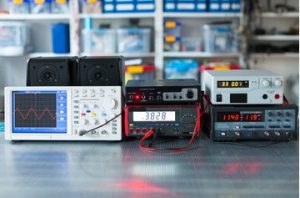
Instrumentation engineers play major roles in manufacturing and processing plants around the world. They work with instruments and controls that measure various inputs to ensure their company’s products are created to standards. Instrument technicians work with them in lesser roles to keep production processes at their peak performance.
Engineers work with computers, electronic equipment and devices, and control mechanisms to observe and control production flow and quality. Sensors that detect variables within these control devices are a major focus of engineers, such as measuring:
- Flow
- Level
- pH
- Pressure
- Temperature
- Voltage
The following functions and responsibilities of instrument engineers and technicians will provide a broad overview of this career.
How the Jobs of Instrumentation Engineers Relate to Instrument and Control Systems Technology
An instrument engineer typically requires a bachelor’s degree and experience in one of these:
- Mechanical Engineering
- Electrical Engineering
- Computer Engineering
- Or related discipline
An instrument and control systems technician works in a team with other technicians and an instrumentation engineer. While engineers may design and improve processing systems, the technician’s role is primarily one of observation, measuring, and reporting. The engineer is the team leader and the tech is the assistant.
Instrumentation technicians need an associate degree from an approved program to acquire an entry-level job. With experience, technicians take on more responsibilities with repairing, maintaining, or replacing instruments and controls.
Basic Functions Of Instrumentation Engineers
Instrumentation engineers perform a variety of functions on the job in industries ranging from aeronautic manufacturing to water treatment plants. Their primary functions include:

- Designing new instruments, mechanisms, and controls
- Preparing and implementing these devices
- Introducing new mechanism ideas
- Researching the life span of current and new equipment
- Administer control systems departments
Other daily functions depend on the final output of the instrument and control system, their company, and the industry.
| “Instrumentation engineers play major roles in manufacturing and processing plants around the world. They work with instruments and controls that measure various inputs to ensure their company’s products are created to standards.” |
Essential Responsibilities Of Instrumentation Engineers
Engineers are responsible for carrying out the work functions we just covered above. They work under their company’s management by taking charge of projects assigned to them including supervision of junior team members. More specific responsibilities given to them include:
- Write and track purchases for control system parts
- Manage the installation of and support for new instruments
- Develop control systems with advanced electronic components
- Manage new engineers and technicians
- Maintain OSHA requirements and safety training
- Insure instruments and control systems meet codes and standards
Instrumentation engineers also test new instruments, devices, equipment, and systems to ensure their effective and efficient functioning. They see that all work is documented and given to company management.
Engineers work with stakeholders to design and develop new controls to improve quality and workflow. When issues develop in the processing line, they troubleshoot them and correct them. The place to begin this fascinating career is by earning an associate degree.
Start with Instrument and Control Systems Technology
Many employees begin their careers by earning an associate degree and working a few years to gain practical experience. From there they may elect to earn a bachelor’s degree to become an engineer. A useful approach to working in this industry is earning an Associate of Occupational Studies (AOS) Degree in Instrument and Control Systems Technology.

Students learn the essentials to work in many different industries. They develop skills in:
- Working with basic electricity and electronics systems
- Common mathematics related to instrumentation and electronics
- Industrial instrumentation concepts related to pressure and level
- Reading blueprints, drawings, sketches, and wiring diagrams
- Using test equipment and basic computer operations
- Basic chemistry, engineering, and physics
Select the right school and program for yourself, enroll, and plan your career.
A Great Place to Earn Your AOS Degree
Are you familiar with ITI Technical College in Baton Rouge? Our award-winning school has an Associate of Occupational Studies (AOS) Degree in Instrument and Control Systems Technology. This program prepares students to find entry-level employment in business and industry in the Gulf Coast region and beyond. We look forward to hearing from you, contact us today!
For more information about graduation rates, the median debt of students who completed the program, and other important information, please visit our website at: https://iticollege.edu/disclosures/




